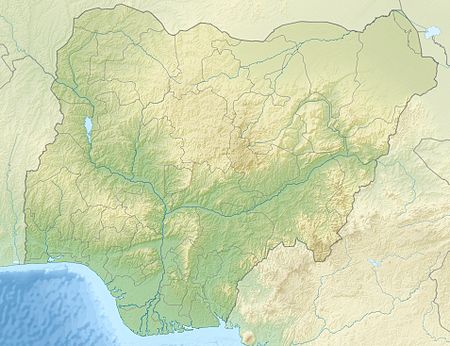Enugu

Enugu (/eɪˈnuːɡuː/ (About this soundlisten) ay-NOO-goo;[8] Igbo: Énugwú)[9][10] is the capital of Enugu State in Nigeria. It is located in southeastern Nigeria. The city had a population of 722,664 according to the 2006 Nigerian census. The name Enugu is derived from the two Igbo words Énú Ụ́gwụ́ meaning “hill top” denoting the city’s hilly geography. The city was named after Enugwu Ngwuo, under which coal was found. Enugwu Ngwuo is one of the ten villages that made up the Ngwuo clan, often referred to as the children of Ngwuako, the ancestral founder of the clan. Ngwuako positioned Udeneogu, his warrior son of on top of the hill (Enu-Ugwu) to protect the clan from invaders. Enugwu Ama Udeneogu, (Enugwu, the land of Udeneogu) The people lived on the hilltop and farmed the sprawling surrounding valleys. Ngwuo has borders with Oshie clan in the south, Ojebeogene clan in the north and Nkanu clan in the east. The discovery of coal deposits on Enugwu Ngwuo farm lands down the valley, attracted people from all and sundry to the newly discovered wealth, in search for means of living, and as depicted in the map of the original plan for a government station, titled Enugwu Ngwo government station, this marked the core of the first urban settlement of what is today known as Enugu, started on Ngwuo land and it was called Enugwu Ngwuo until when it attained township status, the word Ngwo was removed for the convenience of pronunciation, thus a village of Ngwuo clan gave birth to a city which today has grown into a mega city, and still growing, engulfing the surrounding Nkanu towns of Nike and Akunino and stretching towards Neke and Emene.
Since the 17th century the location of present-day Enugu has been inhabited by the Nike (/niːˈkeɪ/ nee-KAY) subgroup of the Igbo people; one of Enugu’s neighbourhoods still retains the village’s old name Ogui. In 1900 the Southern Nigeria Protectorate was established by the colonial administration of the British Empire. The discovery of coal by the colonialists led to the building of the Eastern Line railway to carry coal from the inland city to the port of Port Harcourt, a city created for this purpose located 243 kilometres (151 mi) south[11] of what was called Enugu Coal Camp. Enugu was then renamed simply Enugu and developed as one of the few cities in West Africa created from European contact. By 1958 Enugu had over 8,000 coal miners. As of 2005 there are no significant coal mining activities left in the city.
Enugu became the capital of the Eastern Region after Nigeria’s independence in 1960; a succession of territorial adjustments in 1967, 1976 and 1991 led to Enugu becoming the capital of what is now Enugu State. On 30 May 1967 Enugu was declared the capital of the short-lived Republic of Biafra; for this Enugu is known as the “capital of Igboland.” After Enugu was captured by the Nigerian armed forces, the Biafran capital was moved to Umuahia.
Industries in the city include the urban market and bottling industries. Enugu is also one of the filming locations for directors of the Nigerian movie industry, dubbed “Nollywood”. Enugu’s main airport is the Akanu Ibiam
